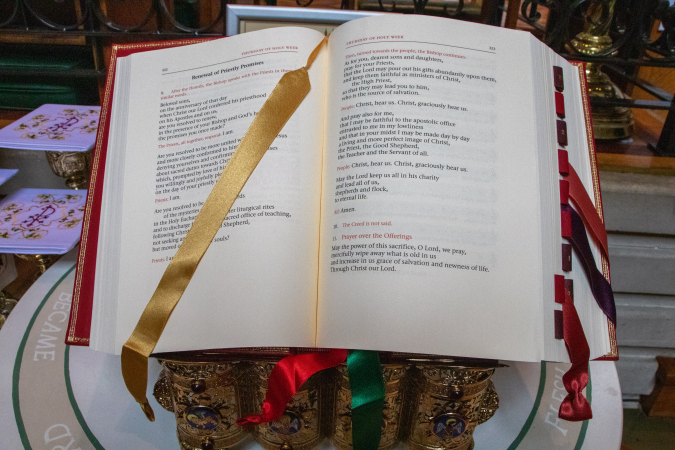
Year C

Discover the deeper meaning and connections found in this week's readings, through these great commentaries written by our priests.

Explore this week's readings and hear what God is saying to us through His Word.

Find out more about how we can mark this special day in our liturgy.

See our music recommendations for the liturgy.
Genesis 18
The first reading presents Abraham as a model of prayer. He is not praying for himself, but for sinners who are facing punishment. The offence of Sodom is often understood as sexual sin, but the prophet Ezekiel offers a broader perspective, involving pride, over indulgence in food, prosperous comfort, and a failure to help the needy (Ezek 16:49). Last Sunday’s first reading described Abraham’s generous hospitality to the three strangers—who turned out to be angels. By way of contrast, the men of Sodom were in the habit of abusing visitors (Gen 19:5). Yet despite this serious sin, Abraham prays at length for the city, bargaining with God to try to prevent its destruction. Thus he becomes an intercessor for sinners.
Colossians 2
Most of us have no memory of our baptism, but St Paul emphasises its powerful effect of forgiveness. Whereas we are guilty because of our sins, our union with Christ offers us the gift of eternal life. Yet this gift is not an excuse for ongoing sin. Christ’s same power to forgive us is also available to us in the sacrament of reconciliation (confession).
Luke 11
Have we Catholics lost the art of prayer? Are we often so comfortable that we have stopped giving time to God—at least, until a sudden crisis happens to us? In today’s gospel Jesus urges us to ask and it will be given to us. Many of us can remember times when we did ask God for something particular, and our prayer was answered. But Jesus is not saying that we can all pray to become millionaires and it will be granted. That is why he gives us guidance in today’s gospel. Although we are more familiar with St Matthew’s longer version (our daily prayer), Luke gives us a shorter version of the Lord’s Prayer.
· We address God, not as a remote Master, but as our own dear Father.
· We pray that people may think of God with respect and awe.
· We pray that God’s kingdom of justice and love may come, including through our own efforts.
· We ask God to provide for our daily needs—and hopefully we also thank him.
· We beg God to pardon our faults—and hopefully we forgive the faults of others.
· We ask God to spare us from very difficult situations—and hopefully we thank him for his providential care for us.
Like Abraham in the first reading, our prayer can go beyond our own immediate needs and can seek to benefit others.
The Collect of today’s Mass offers a context for Christian living, which is simply the absolute authority of God. This is insisted upon twice. First, that without God there is no strength or good (compare John 1:3). Second, this source of abundant mercy (the sense of the Latin ‘multiplica’) allows us, again beneath God’s primacy, to take and use this world’s goods which are only temporary, as a way to come to a life which is lasting. This comparison is rendered in the Latin by two ablatives, transeuntibus and mansuris.
We are responsible before God for all our actions and how we use the good things of this world. No action of ours is without its eternal consequences.
Many of us will be on our holidays at this point in the year, so we can apply this prayer to see how we should use the opportunities for a change and a rest as away to eternal life under God’s direction. St. Benedict in the Prologue to hisRule for Monks made a similar point: While there is still time, while we are in this body and can fulfil all these things by the light of this life, {we should} hasten to do now what may profit us for eternity.
Why not have a change and use Eucharistic Prayer 4 during the Summer period?
Hymn choices are taken from the Laudate Hymnbook:
Dear Lord and Father of mankind 935
Bread for the world 625
I heard the voice of Jesus say 795
Seek ye first the kingdom of God 820

Do you have questions about the liturgy and how we are called to participate in it? Explore how the Church councils, saints, and popes have answered this key question and many more.

Every movement of the Mass is rich in meaning but we can become over-familiar with it. Rediscover the Mass and explore how it relates to the Exodus story, where many of its rituals come from, and how it makes Jesus present to us today.